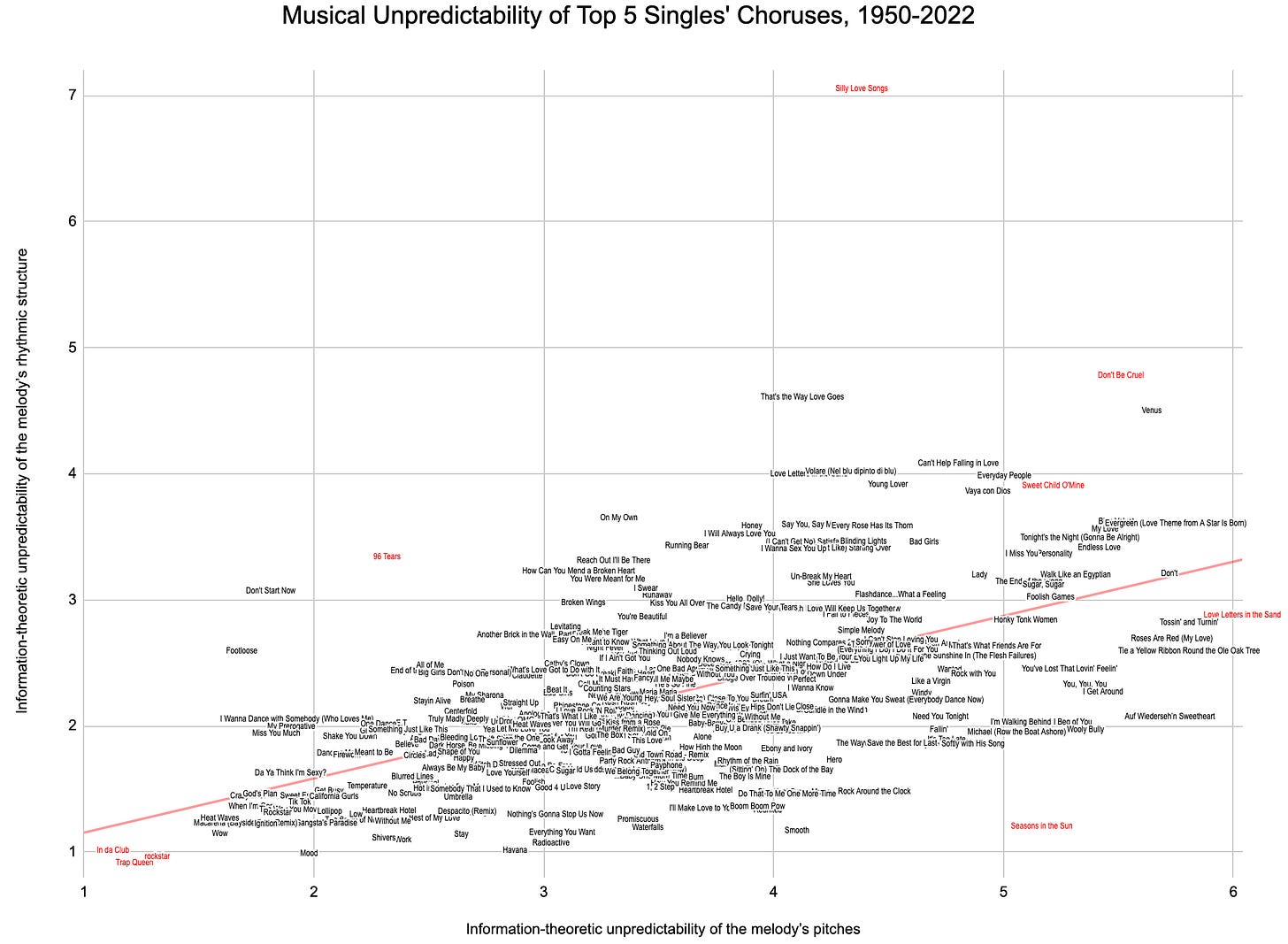What's the 21st Century's Worst Hit Song? The Dumbing Down of Pop Melodies 1950-2022
In terms of the pitch and rhythmic interest of the chorus’s melody, what are the worst smash hit songs of the last three-quarters of a century? And why are the really boring songs mostly from this century?
I’m old and over the hill so I try not to roll my eyes over the music of Kids These Days. But still … The New York Times’ coverage of a new study emphasizes the decline in creativity of melodies in hit songs
Melodies of Popular Songs Have Gotten Simpler Over Time
A new study that reviewed Billboard hits from the past 73 years found a steady simplification of rhythm and pitch.
So, it’s not just geezers like me. Instead, The Science proves that recent pop music is lame.
By Alexander Nazaryan
July 4, 2024
… a new study conducted by computational musicologists at Queen Mary University of London has found that vocal melodies in popular music have become much less complex over time.
The study, published on Thursday in the journal Scientific Reports, used mathematical models and algorithms to pinpoint three “melodic revolutions” — in 1975, 1996 and 2000 — that brought increasing simplicity to the two main components of melody: rhythm, or the pattern of sounds and silences in a piece of music, and pitch, the measure of how high or low the notes are.
Looking at the data used in the study, I think the authors’ search for epochal turning points is a red herring. There was instead a steady decline of musical sophistication over 1950-2022 from the jazz era to the rock era to the rap era.
The study looked at the top five Billboard songs every year from 1950 to 2023. Both rhythm and pitch became steadily less complex over that period, the study found. “Conservatively, they have both decreased by 30 percent,” said Madeline Hamilton, a graduate student at Queen Mary University who led the research.
Data buried away in Github backing up the new study, “Trajectories and revolutions in popular melody based on U.S. charts from 1950 to 2023” by Madeline Hamilton & Marcus Pearce in Scientific Reports of the Billboard top 5 American hits of each year from 1950 through 2022, suggests three striking nominees for weakest combination of innovative pitch and rhythm in the chorus melody to make it to the top of the charts:
50 Cent’s “In Da Club” from 2003
Post Malone’s “rockstar” from 2017
Fetty Wap’s “Trap Queen” from 2015
See the lower left corner of this scatter chart I created from Madeline Hamilton’s database, with pitch unpredictability along the horizontal axis and rhythmic unpredictability on the vertical axis.
Note that my graph only represents the chorus of each hit, not the other parts of the song.
The Top 5 single with the most rhythmic unpredictability in its chorus melody is, by far, Paul McCartney and Wing’s 1976 hit “Silly Love Songs.”
I can recall a friend back then pointing out to me that the way to get the most artistic enjoyment out of Wings’ songs on the car radio was to turn the treble knob all the way down and the bass knob all the way up so you just hear Paul play his bass. The joke behind “Silly Love Songs” is that McCartney ostensibly defends musical sappiness, while hiding in plain sight is his own wizardry. By his mid-30s, McCartney was an extraordinarily skilled and inventive bass player, although that’s perhaps a little like if Patrick Mahomes were an All-Pro punter, and a rather bored punter at that.
Number two in chorus rhythmic interest is “Don’t Be Cruel” from Elvis Presley’s annus mirabilis of 1956.
The model’s pick for most pitch unpredictability is Pat Boone’s 1957 cover of a 1931 standard, “Love Letters in the Sand.”
The oldest songs usually do best in terms of complexity. A hit single from the later 20th Century that scores well on both measures of chorus melodic inventiveness is “Sweet Child O’ Mine,” the 1988 debut single by Guns N’ Roses.
An interesting comparison is Terry Jacks’ hit 1974 version of Jacques Brel’s “Seasons in the Sun” in the lower right of the graph (clever melody and inane rhythm)
vs. Chicano band ? and the Mysterians’ 1966 hit “96 Tears” in the upper left (primitive pitch differences vs. interesting rhythm in the chorus’s melody).
In my day (which, as I may have mentioned, was a long, long time ago), “96 Tears” was considered much cooler than “Seasons in the Sun.” The first time I saw The Clash in 1978, “96 Tears” was their walk-on music. In contrast, failed rock star Dave Barry of the 1960s band Federal Duck called “Seasons in the Sun” “A song about a guy who is dying, but not nearly fast enough.”
Why is the creativity of hit song melodies declining over the decades? It’s going down fast for pitch:
and not as fast for the rhythm of the melody:
My explanation is simple: Americans were just plain better at music in the jazz / standards era of mid-century; wait for fill-in pianist Jess Stacy’s solo at 9:27:
were enthusiastically mediocre during the rock era; and are lousy during the hip-hop era.
My guess is that the percentage of Americans who can perform music at a serious level of competence has gone down steadily over the generations as the ability to hear recorded music has become ubiquitous.
Also, keep in mind that priorities changed. The rock era obsessed over getting novel timbres out of the electric guitar. In the early 80s, I was a pretty good competitive name-that-tune player when pushing the buttons on FM rock stations because I could name, say, The Who’s “Won’t Fooled Again” in one unique-sounding guitar chord rather than wait for the melody to emerge.
A historically not unfruitful quest to wring every type of sound possible out of one instrument, but one that doesn’t show up in this database of MIDI transcriptions.
Similarly, I’m sure the rap era has had its own non-melodic goals as well — letting you know what today’s youth have on their minds? — but I haven’t been able to pay attention long enough to notice.
But I’m extremely old, so what do I know?






The simplification of music is perhaps another good indication of the global IQ decline.
You're no older than you feel. I remember the 50s and 60s and thought the music was great. My mother, who had a beautiful voice, would sing the songs of the 20s, 30s and 40s and so I know them as well. I don't really think it has as much to do with pitch as it does with the deliberate dumbing down of American education. It's across the board, not just math, science, reading, writing, it's music and even social engagement. No one can hold a decent conversation today. Their phones take up all their time and interests.
In the 1880s, John Dewey (not the one of the decimal system) brought forth his liberal education. John Rockefeller was so enthralled with it that he sent all four of his sons through this education. All of them were functionally illiterate and dyslexic. In the 1930s, teacher's unions were the goals, and the Marxists were already subtly in the field. Former Congressman Shafer and John Howland Snow exposed the Marxists in their 1953 book, THE TURNING OF THE TIDES.
Just about everything we've lost in this once great country goes back to education and the lack thereof. Think of our founders and what they had already learned by their 20s. No one today can compare.